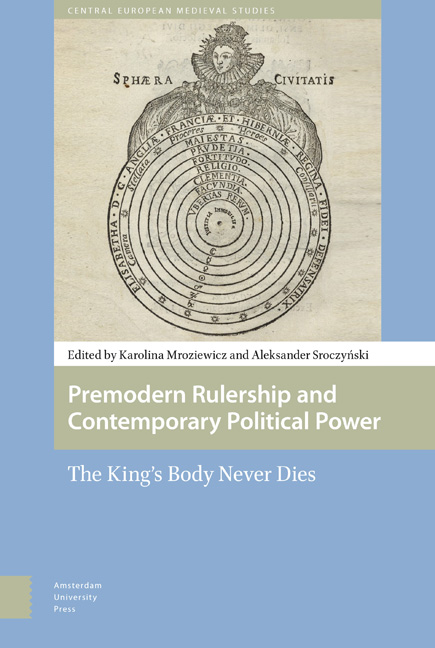Introduction
Published online by Cambridge University Press: 24 December 2020
Summary
The main objective of the present volume is to investigate the cultural specificity and inner dynamics of premodern rulership and contemporary political power. The initial impulse behind such a broad inquiry came from the work of Ernst Kantorowicz, whose book The King's Two Bodies: A Study in Mediaeval Political Theology offers one of the most influential modern theories for the analysis of political order. Sixty years after its first publication, a group of twelve authors convened to reassess the dichotomy of the ruler's two bodies as proposed by Kantorowicz: the perennial dignity of the royal office and the vulnerable body natural of the king. The present survey was intended to examine a variety of literary and visual sources testifying to different representations of political power in both the premodern and contemporary era.
The authors represented here are among the most recent generation of scholars inspired by The King's Two Bodies, a book which was praised as a masterpiece of medieval scholarship almost immediately after its publication, and influenced many other works dealing with royal or papal bodies, as well as studies exploring the exchange between theological and political ideas in European civilization.
Nevertheless, in 2009 Bernhard Jussen pointed out that ‘a serious discussion of [Kantorowicz’s] historical narrative and empirical validity has not taken place.’ He adds that ‘Kantorowicz's narrative is still there to be discussed; the curiosity in political semantics predating the “State” is as fresh as it was in his day.’ How is it that one of the most quoted books of the previous half-century has not yet lost its potential to inspire contemporary debate?
By examining the intersection of political and religious realms, Kantorowicz offers an insight into foundations of the European civilisation. The key issue discussed in The King's Two Bodies is the process of secularisation, which led to the emergence of an early modern state created in the image of the Church (corpus Christi mysticum). This process, shaped by the exchange of political and religious ideas and ideologies, proved to be one of the principal issues in the post-war debate regarding the condition of the Western world.
- Type
- Chapter
- Information
- Premodern Rulership and Contemporary Political PowerThe King's Body Never Dies, pp. 9 - 18Publisher: Amsterdam University PressPrint publication year: 2017



